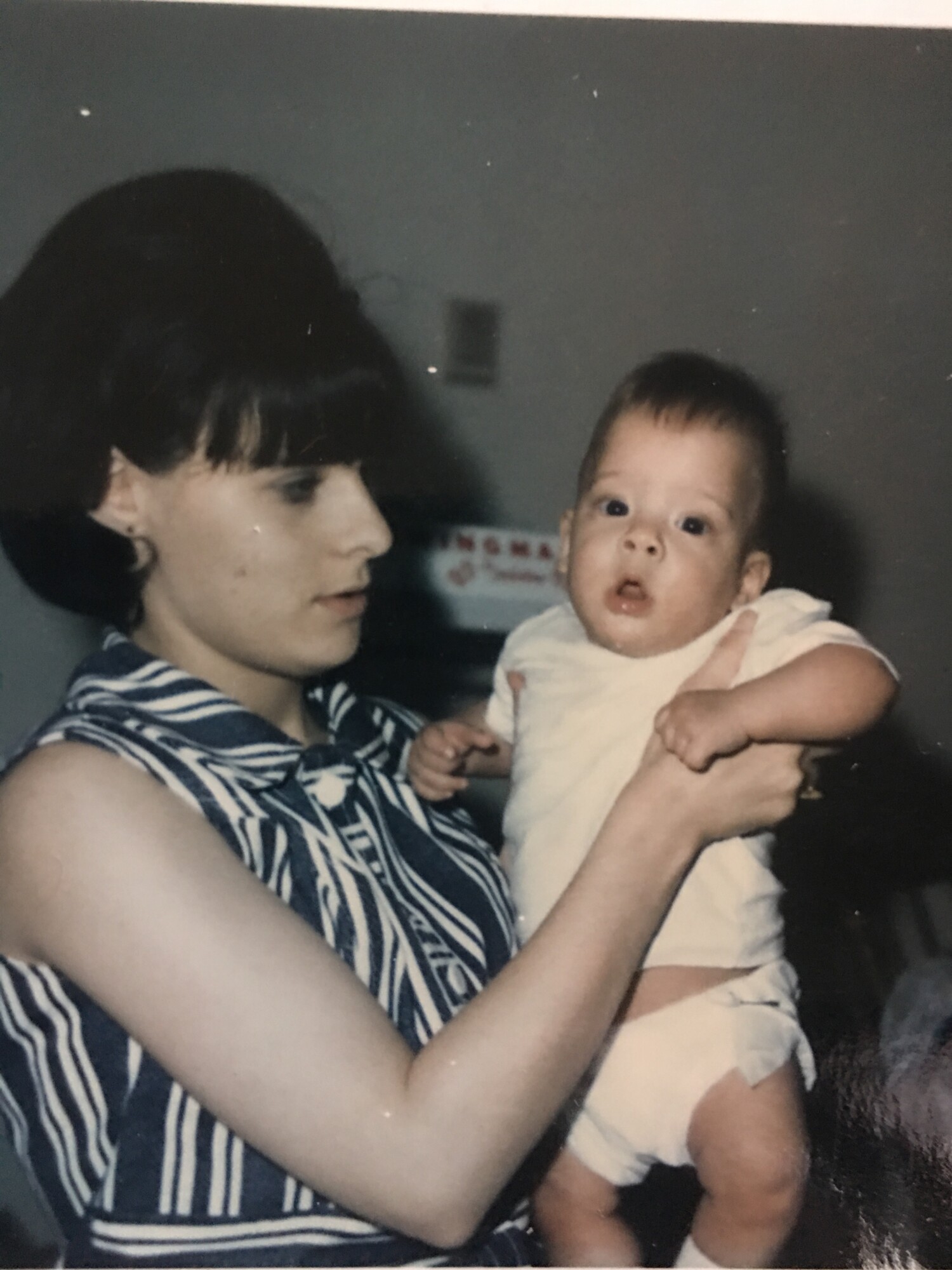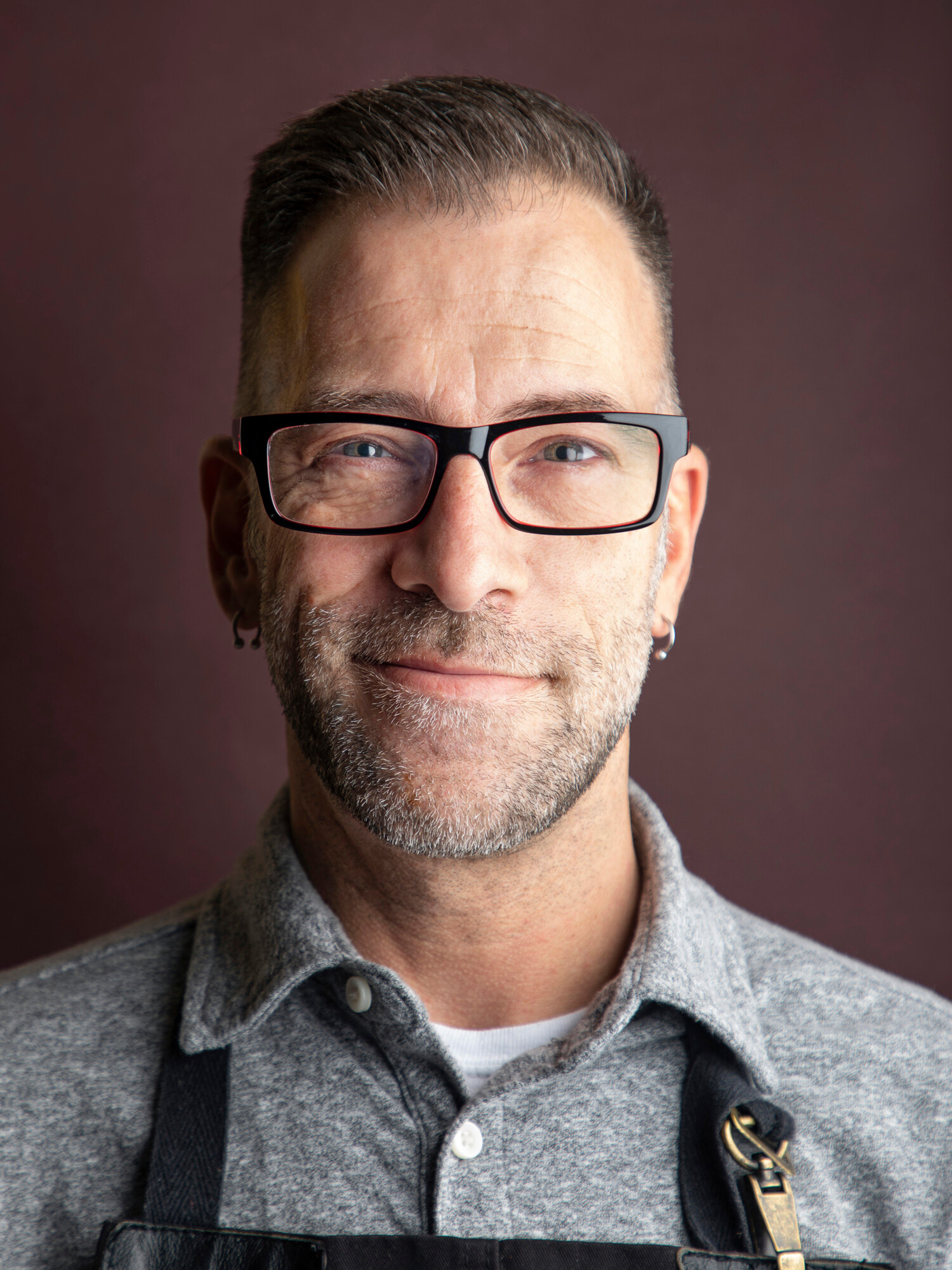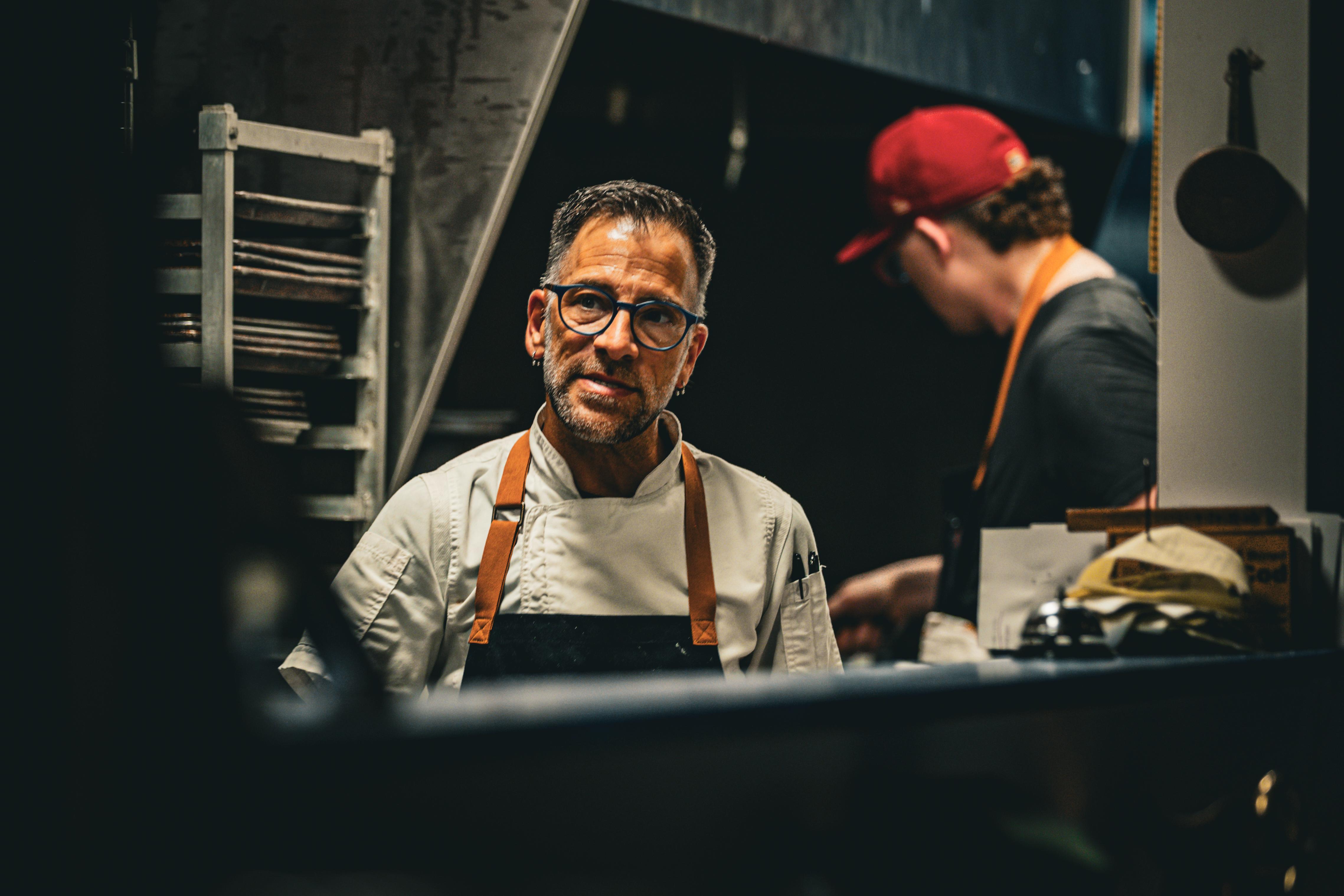
Chef Gregory Leon: serving life's greatest moments

“Cooking for someone and sharing a meal is the fastest way to make them feel community."
Chef Gregory León, owner of Milwaukee’s Amilinda, is serving up flavors from Spain and Portugal with a side of social responsibility.
Since opening Amilinda on Wisconsin Avenue in 2015, the highly acclaimed chef continues to dish out delicious meals and give back to the city he now calls home. He is one of the Milwaukee’s most highly awarded gay chefs and has been an unflinching advocate for other local queer professionals
León was born in Tulsa, Oklahoma, but moved to his family’s native country, Venezuela, when he was five years old. It was there León first took an interest in cooking. He would sneak his mother’s cookbooks into his room, scouring the pages in secret because he was told the kitchen was no place for men.
“I grew up in a very macho-centric society...boys play sports, they workout, they don’t cook, they aren’t in the kitchen,” recalled the Chef.
At that bar, surrounded by people like him, León finally acknowledged what it was that had made him feel different from everyone else.
“On the walk back home, I had already sort of come out to myself. I had told myself, ‘Clearly this is who you are and you can’t f---ing change it,'” León recalled. “That whole process, coming to terms with, probably lasted me only four ours.”
He was living with his grandparents at the time, and his grandmother was initially not very happy when León told her the news. With time though, she began to accept him for who he was.
He came out to his father right around the time he got kicked out of school, and was worried that his father would be more resistant because of his macho upbringing.
León sent his father a letter, and when he came home, he saw his dad in the kitchen doing dishes. He expected a fight, but his father stated: “Your mom and I have known for years, what’s there to talk about? You got kicked out of college.”
León said, “He was more concerned with what I was going to do with my life, than me being gay.”
He had no idea what he was going to do, and it had not even dawned on León yet that he could ever become a chef. At the time, the culinary world had not developed the social cachet it has today.
“The Food Network hadn’t come out until 1993, and there were maybe two celebrity chefs that people knew about.”
Then, one night he caught an episode of "Great Chefs” on the Discovery Channel, and it was at that moment he realized he wanted to cook for a living.
He confessed his newfound passion to a friend of his visiting from San Francisco.
“She told me, if I was serious about this, I had to get the hell out of Oklahoma.”
In the 90s, León recalled there being only two major food cities, San Francisco and New York. He pondered his options for a few days, and ultimately decided to get on a bus and head straight to the SF.
“I didn’t know anyone, I had $700 in my pocket, I didn’t even tell my family,” said the Chef, “I chose San Francisco thinking it was going to be warm, because it’s California, and if I needed to sleep outside because I can’t find a place to live, at least it’s warm.”
He got there in the beginning of December, and it was freezing cold and pouring rain.
Luckily, it all worked out for him, he found a place to live and got his first job at a restaurant that was considered a pillar of the city’s food scene, Zuni Café.
He lied to get the job, because he had never cooked professionally before, and only stayed for three months until they found out. However, he said it opened so many doors for him.
It allowed him to get a pastry chef job at the Alta Plaza, a restaurant well known for its deep connection to San Francisco’s queer community. He is thankful that while improving as a cook and progressing through the industry, he had found a place like Alta Plaza and was grateful he did not face the same discrimination other gay chefs have to endure.
“Kitchens can be a pretty shitty place to work in if you are gay...but I was lucky enough that in San Francisco I never really had to deal with that.”
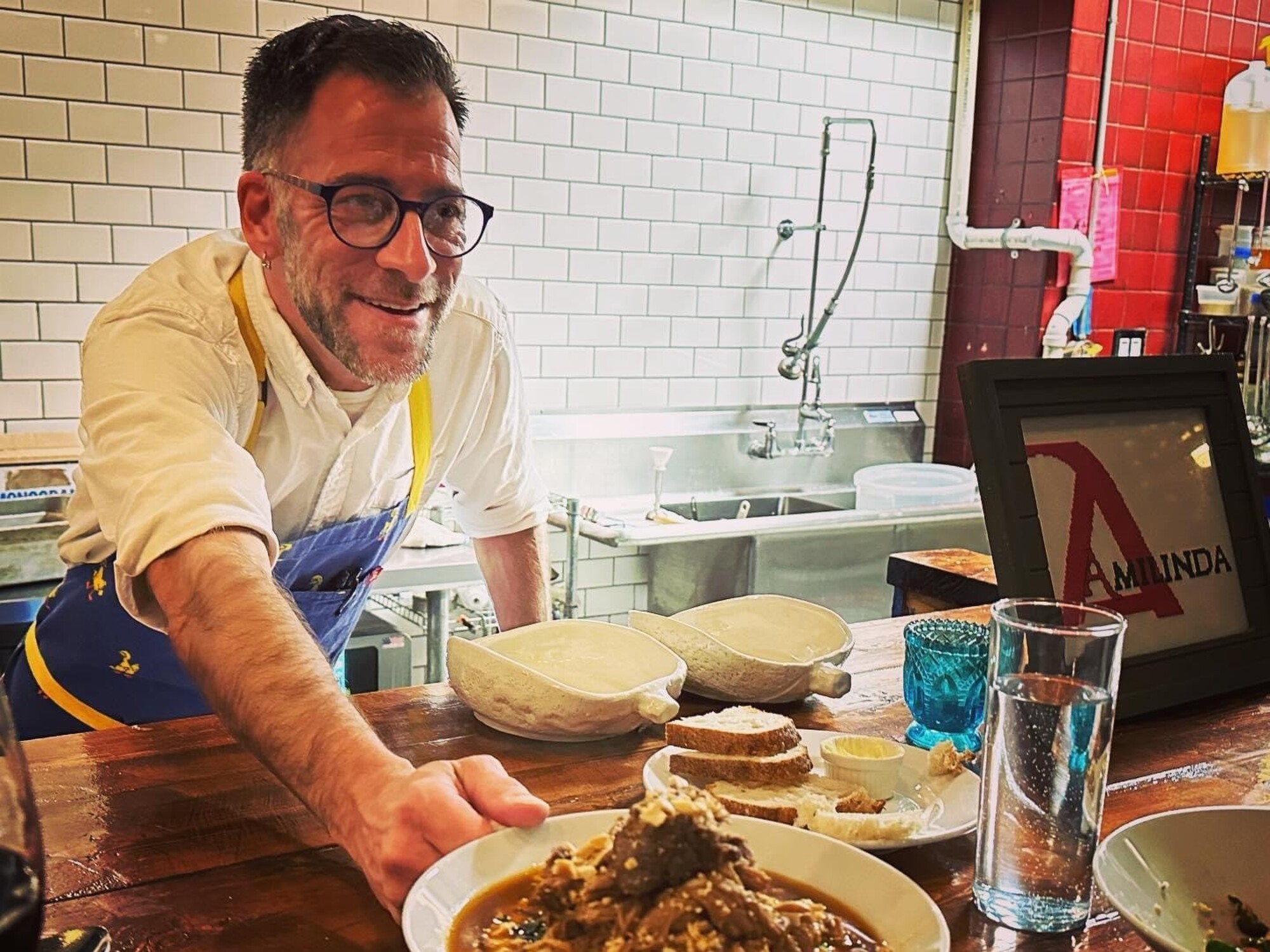 Chef Gregory Leon
Chef Gregory Leon
When he was 27, León got connected with Richard Stevens, who became his mentor. The chef was looking for a young, relatively unknown American cook who could take over his restaurant in Spain when he retired.
He flew to Madrid, having never been to Spain before, and fell in love with Spanish cuisine.
León never ended up buying the restaurant, but still credits him for much of his professional development in the kitchen. Sadly, Stevens passed away this year.
He has remained a key inspiration for León. The cuisine at Amilinda is influenced by Stevens and his admiration for the flavors of the Iberian Peninsula.
After working in San Francisco for 18 years, León decided it was time to open his own restaurant. Wanting to escape the high cost of living, he looked outside California to set up his new life.
While searching for his capital, a friend encouraged him to visit Milwaukee. The chef had never even been to the city, let alone considered opening a restaurant there.
He had reservations about the cold weather but tried it out anyway. After a meal in Cream City staple, Odd Duck, León decided this is where he needed to be.
As unlikely as the circumstances seemed, León insists he was meant to open his restaurant in Milwaukee and he has been operating here since 2013.
He named the place after his father Amilcar and his mother Linda. It is a portmanteau that forms the Spanish phrase “a mi linda,” which translates to “to my beautiful,” and it was the same name his parents gave to his family home in Venezuela.
The concept for Amilinda started as a series of pop-ups he did with his then-partner Orry. In 2014, Nell Benton, who owned National Café at the time, allowed León to rent the space every Saturday as a semi-permanent home for Amilinda.
The following year, León and Orry bought the location at 315 W. Wisconsin Ave, where the restaurant stands to this day.
Amilinda faced its fair share of hardships, and during the COVID-19 pandemic, the pair split. They remained good friends, and León has always been grateful for Orry’s partnership and support with getting Amilinda off the ground.
Since opening his restaurant, León has become a three-time James Beard Award nominee.
He was honored as a finalist for Best Chef Midwest in 2022 and 2023, and a semifinalist for Outstanding Chef in 2024.
While he is a clearly talented chef, he maintains that he cannot take all the credit, and the success of Amilinda is in large part due to his hardworking staff. Over time, he has built strong relationships and a bond of mutual trust between him and his cooks.
Without them, Amilinda would not be what it is today.
León has also been grateful for the Milwaukee community for being so kind to him and supportive of Amilinda.
“Milwaukee has been such a welcoming city to someone who is not from here, and they have made my restaurant so successful, and I am constantly surprised by the support and love that we get from the Milwaukee community,” remarked the chef.
He has paid forward that love by holding charity events and underrepresented rising-star chefs at his restaurant.
Last February, it hosted this year’s first “Tables Across Borders” pop-up dinner, in which refugees from Burma showcased dishes from their home country. All proceeds from the dinners went directly back to the refugees that prepared them.
This year Amilinda hosted an event called “Out! For Dinner,” bringing together queer chefs from Chicago and Milwaukee to cook a five-course meal. On September 12, they also participated in “Dining Out for Life,” and donated 25% of their dine-in sales from that day towards expanding HIV prevention with Vivent Health Wisconsin.
During the pandemic, León also used Amilinda’s kitchen to feed the homeless and help keep other restaurants afloat. Amilinda distributed about 40,000 meals in a span of two years and raised over $500,000 for local restaurants.
Amilinda was always about giving back to the community. León said one of his expressed goals with the restaurant was to create a place where people could launch careers, but he always wanted to make sure people felt safe while they did.
“My goal was to open a place where people feel comfortable and they can come in and be themselves,” said the chef.
He does not want people to come into work worried about what other people will think about them. “I want them to just let go of all that baggage and just focus on what they do, and really excel at their craft.”
Chef León understands how the food we eat and the meals we share is an expression of love and care for the people we are surrounded by. Some of life’s most important moments take place over a meal.
Leon notes that, “Cooking for someone and sharing a meal with someone is the quickest way to make someone feel like they are part of a community,” and his restaurant embodies that idea.
At Amilinda, León wants to make sure everyone has a seat at the table, and no one is left behind.
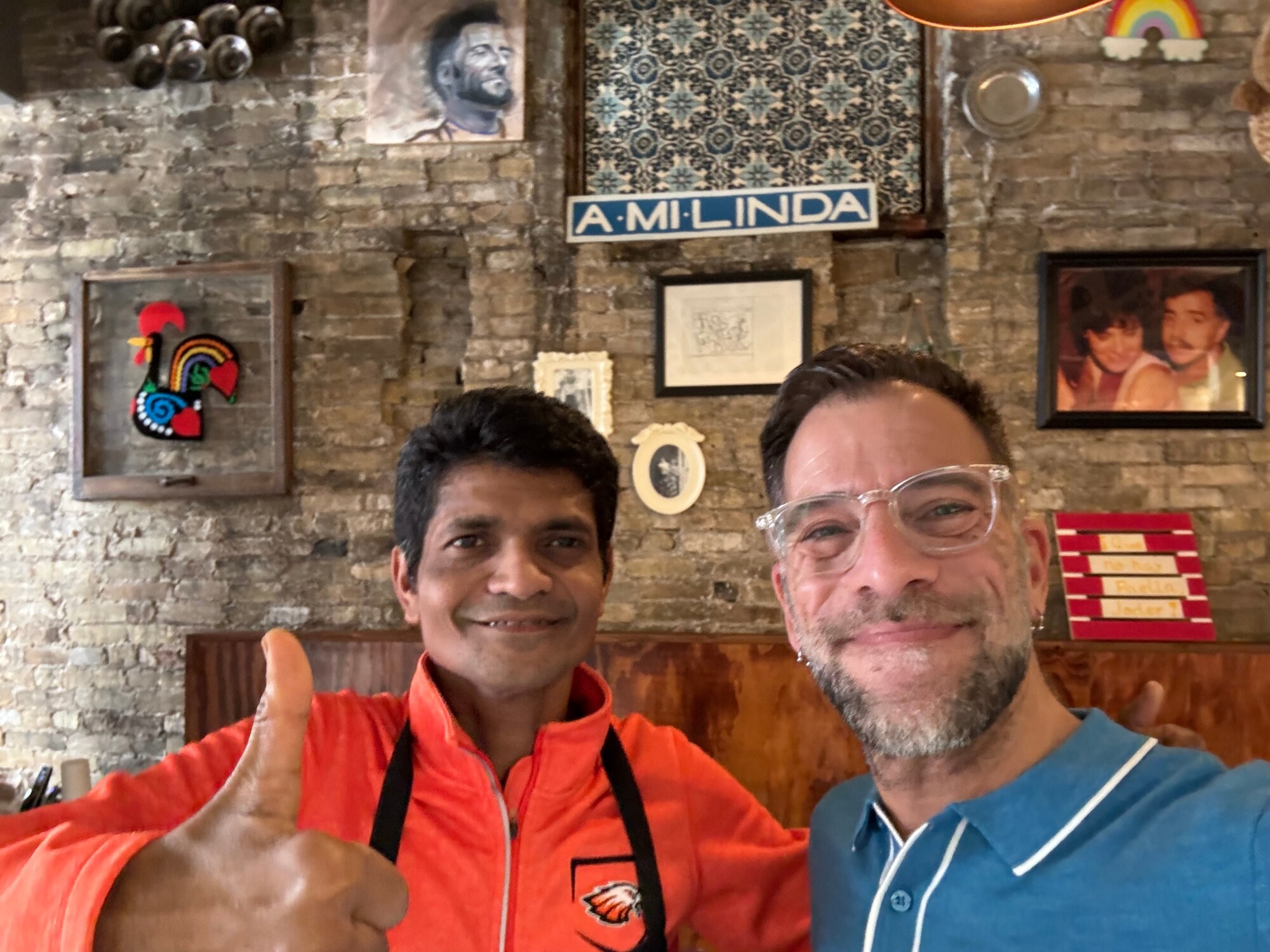 Chef Gregory Leon
Chef Gregory Leon
recent blog posts
December 17, 2025 | Michail Takach
December 16, 2025 | Michail Takach
December 01, 2025 | Dan Fons
The concept for this web site was envisioned by Don Schwamb in 2003, and over the next 15 years, he was the sole researcher, programmer and primary contributor, bearing all costs for hosting the web site personally.
